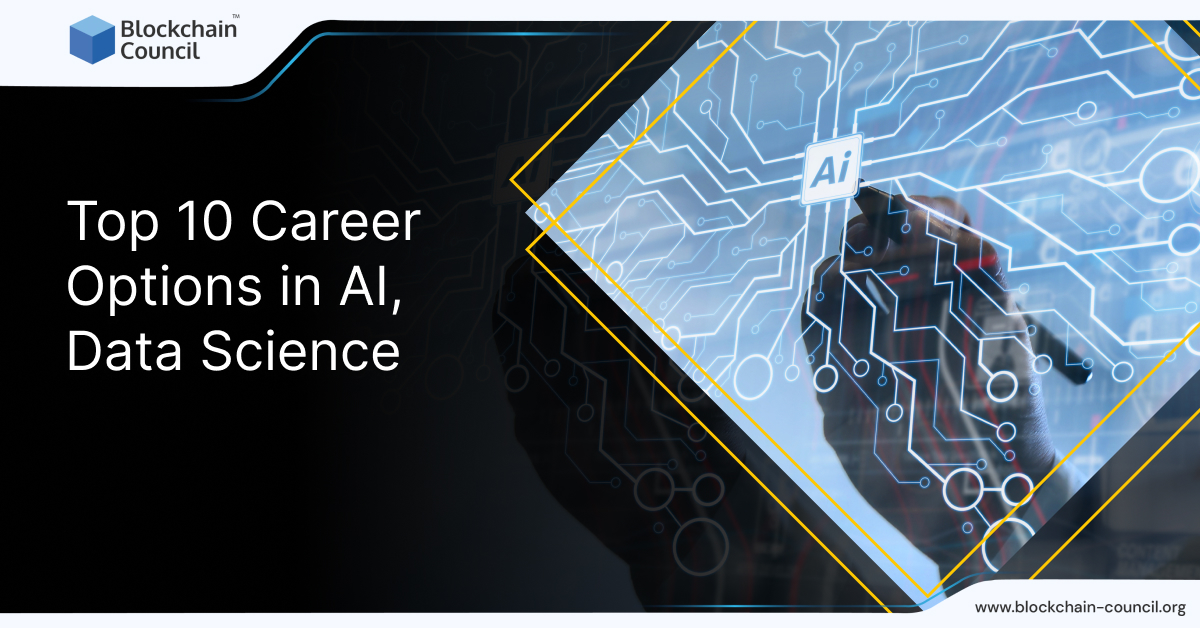Artificial intelligence has transformed numerous industries in recent years, offering unprecedented opportunities for the future. From space exploration to melanoma detection, AI has revolutionized sectors and demonstrated its transformative potential. Consequently, there is a surging demand for AI and Data Science professionals, with LinkedIn identifying artificial intelligence practitioners as one of the fastest-growing job categories in 2022.
In this article, we will explore ten lucrative and exciting AI and Data Science careers to pursue not only in 2023 but also in the years ahead. Additionally, we will discuss the importance of learning AI development and Chatbot training courses in gaining a comprehensive understanding and competitive edge over these domains.
The Bright Outlook for AI and Data Science Jobs: Growth, Diversity, and Ethical Focus
The future of AI and Data Science jobs is highly promising, supported by various indicators and projections. The US Bureau of Labor Statistics predicts an impressive 11% growth in computer science and information technology employment from 2019 to 2029, resulting in around 531,200 new jobs.
As the AI industry matures, job opportunities will multiply and become more diverse, catering to professionals at different levels and backgrounds. Roles for researchers, statisticians, practitioners, and experimental scientists will emerge, offering a wide range of career options.
Moreover, the rise of Artificial intelligence and Data Science in society will bring a growing focus on ethical considerations, leading to increased demand for professionals well-versed in ethical AI. This presents a positive outlook for those interested in contributing to the responsible development, deployment, and governance of AI systems.
What AI and Data Science Career Paths Can You Pursue?
Machine Learning Engineer
Machine learning engineers combine software engineering and data science expertise to develop scalable data science models capable of handling large volumes of real-time data. They utilize big data tools and programming frameworks to create production-ready models.
Data Scientist
Data scientists play a crucial role in collecting, analyzing, and deriving insights from data for various purposes. They employ a range of technology tools, algorithms, and processes to extract knowledge and identify meaningful patterns from data. Their tasks can range from identifying anomalies in time-series data to making complex predictions and recommendations for the future.
Business Intelligence Developer
Business intelligence (BI) developers analyze complex internal and external data to identify trends. Their role varies depending on the industry; for example, they may monitor stock market data for investment decisions in a financial services company or track sales trends to inform distribution strategy in a product company.
Unlike data analysts, BI developers primarily focus on designing, modelling, and maintaining complex data in highly accessible cloud-based platforms. They ensure that business users can easily access the data through dashboards, although they do not typically create the reports themselves.
Research Scientist
Research scientists in the field of Artificial intelligence and Data Science are highly focused on academic pursuits. They are responsible for formulating innovative questions that can be addressed using AI technologies. These professionals possess expertise across various domains of artificial intelligence, including mathematics, machine learning, deep learning, and statistics. Similar to data scientists, a doctoral degree in computer science is typically expected for this role.
Big Data Engineer/Architect
Big data engineers and architects play a critical role in establishing effective communication between different business verticals and technologies. Their responsibilities involve planning, designing, and developing big data environments using Hadoop and Spark systems, making their role more hands-on compared to data scientists.
Software Engineer
Artificial intelligence software engineers specialize in building software products specifically designed for AI applications. They bring together various development tasks, including writing code, continuous integration, quality control, and API management, to support AI-related projects. They are responsible for developing and maintaining the software utilized by data scientists and architects, while also staying updated on the latest advancements in artificial intelligence technologies.
Software Architect
Artificial intelligence software architects are responsible for designing and maintaining systems, tools, platforms, and technical standards specifically for artificial intelligence technology. They play a crucial role in creating and managing AI architectures, implementing solutions, selecting the appropriate toolkit, and ensuring seamless data flow.
Data Analyst
The role of a data analyst has evolved with the rise of Artificial intelligence. Previously focused on mundane tasks, data analysts now contribute to the field of AI. They prepare data for machine learning models and create insightful reports. Proficiency in SQL, Python, analytics dashboards, visualization tools, and business intelligence is necessary for success as an AI data analyst.
Robotics Engineer / Ai Engineer
Robotics engineers are crucial in the AI field, developing and maintaining AI-powered robots for various applications. They require advanced degrees in engineering or computer science and expertise in machine learning. Knowledge of CAD/CAM, vision systems, IoT, and related technologies is also important.
NLP Engineer
NLP engineers specialize in human language processing, working on voice assistants, speech recognition, and document analysis using NLP technology. Engineers need expertise in semantic extraction, data modelling, sentiment analysis, and more. Proficiency in Python, ElasticSearch, and web development is advantageous.
Unleashing the Power of AI Developer and Chatbot Certification
In today’s competitive job market, acquiring specialized skills through AI Developer certification and AI Chatbot courses can provide a significant advantage. These courses offer comprehensive training in the specific domains of Artificial intelligence development and chatbot training. By enrolling in these courses, individuals can gain in-depth knowledge of the latest Artificial intelligence technologies especially generative AI, programming languages, and development frameworks. Moreover, these courses often include hands-on projects and real-world case studies, enabling learners to apply their knowledge in practical scenarios.
Artificial intelligence certification courses provide a structured learning path, covering essential topics such as machine learning, natural language processing, conversational AI, and data analysis. They offer a comprehensive understanding of the underlying principles and methodologies involved in AI development. Learners gain proficiency in programming languages such as Python, R, and Java, as well as frameworks like TensorFlow and PyTorch.
Furthermore, AI Developer and Chatbot certification courses often provide opportunities for networking and collaboration with industry professionals and fellow learners. This fosters a supportive learning community and opens doors to potential job opportunities and partnerships.
By completing the AI certification exam, individuals demonstrate their commitment to professional growth and their dedication to staying updated with the latest advancements in the field. Employers highly value certified professionals, as these certifications validate their expertise and competence.
Conclusion
AI and data science offers a wide array of career opportunities across various industries. Acquiring AI and Chatbot certification is essential for individuals looking to excel in these fields. These certifications provide a solid foundation, equipping professionals with the necessary skills and knowledge to thrive in the ever-evolving world of AI and data science.
Blockchain Council, an authoritative group of subject experts and enthusiasts, offers a comprehensive range of courses, including AI developer certification and chatbot certification, to cater to the growing demand for expertise in these fields. Blockchain Council is at the forefront of promoting and disseminating knowledge about blockchain technology, which complements the domains of AI and data science.
As a private de-facto organization working tirelessly to proliferate blockchain technology globally, Blockchain Council creates an environment and raises awareness among businesses, enterprises, developers, and society. Their educational initiatives provide learners with a deep understanding of the potential of blockchain technology and its applications in various sectors.
By enrolling in Blockchain Council’s AI development and Certified Chatbot Expert courses, individuals can benefit from the expertise and guidance of industry professionals. These courses offer a structured learning path, combining theoretical knowledge with practical projects, enabling learners to apply their skills in real-world scenarios. Moreover, Blockchain Council’s global network provides ample opportunities for networking and collaboration with like-minded professionals, further enhancing career prospects.
With the rapidly evolving landscape of technology, embracing AI and data science, along with the transformative power of blockchain, is paramount. By gaining expertise through Blockchain Council’s certification courses, professionals can position themselves at the forefront of innovation and contribute to shaping the future of these dynamic fields.












